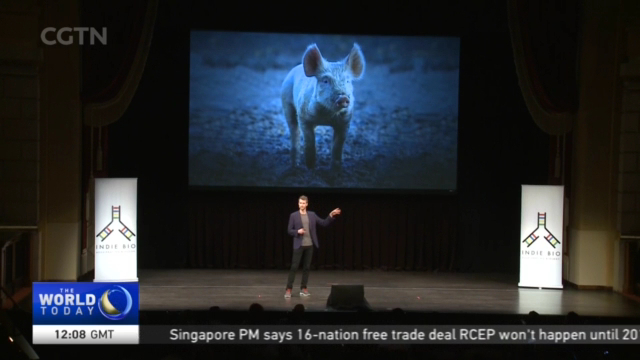
20:33, 14-Nov-2018
Life Sciences Startups: Accelerator focuses on biotech to solve big problems
Updated
20:05, 17-Nov-2018
03:07

Taking life sciences and accelerating it. That's the mission behind a startup accelerator called IndieBio. The program recently graduated its latest crop of companies that are working on some radical scientific approaches to shaking up a variety of industries. Mark Niu has the details.
At IndieBio accelerator's Demo Day, New Age Meats shows the very pig it took cells from.
"We induced them to muscle and fat. And then put them together to create pork sausage."
While one startup offers a more ecological diet, another startup has a recipe to starve a disease to death. Filtricine has designed a drug-free diet that deprives cancer cells of nutrients.
"By removing these nutrients from the blood, we believe we can cripple cancer growth without harming the normal healthy cells."
MARK NIU SAN FRANCISCO "Life sciences and biotechnology are no longer the exclusive domain of university labs and pharmaceutical companies. Science has become much cheaper and sequencing much faster, opening the door for startups to play a major role. IndieBio accelerator also believes scientists can become entrepreneurs."
ARVIND GUPTA FOUNDER, INDIEBIO "Scientists are born entrepreneurs. What we're doing is unlocking it. In other words, when you think about writing a research paper, you're thinking about all the things you need to do to check the boxes to make it accepted by a publication. When you're building a company, it's the same thing. They're just different boxes."
IndieBio founder Arvind Gupta says this seventh batch of startups is taking technology and science deeper than ever before.
Take, for example, NovoNutrients, which collects untreated carbon dioxide emissions, feeds them to bacteria high in protein, eventually forming fish feed.
DAVID TZE CEO, NOVONUTRIENTS "We think it's the cheapest way to make bulk protein. When we live in a world that's consumed by resources, the one thing we have a lot of is Co2 emissions."
With respect to human consumption, Oralta is attacking an age-old problem, bad breath. Its probiotic pills seek to colonize the mouth with healthy bacteria, far different from taking a breath mint.
PATRICK SCHWIENTEK CO-FOUNDER, ORALTA "All these mints and things, they just overpower the bad breath you actually have. We are different in that we are shifting the underlying oral microbiome to a healthy stage. You can say we are tackling the root cause of the problem rather than trying to mask it."
This device from Clinical drew laughs for its visual elements, but the smart toilet monitor takes on a serious matter, examining your stool daily for early signs of colon cancer.
MEDINA BAITEMIROVA CO-FOUNDER, CLINICAI "It's basically how the stool looks like. If you were, for example, to think of blood and stool, texture changes in responses to colorectal cancer, all those surface changes in stool can be captured by our sensor."
Each startup still faces a long road ahead. But even if just one of these crazy ideas succeeds, millions of lives could feel the impact. Mark Niu, CGTN, San Francisco.

SITEMAP
Copyright © 2018 CGTN. Beijing ICP prepared NO.16065310-3
Copyright © 2018 CGTN. Beijing ICP prepared NO.16065310-3